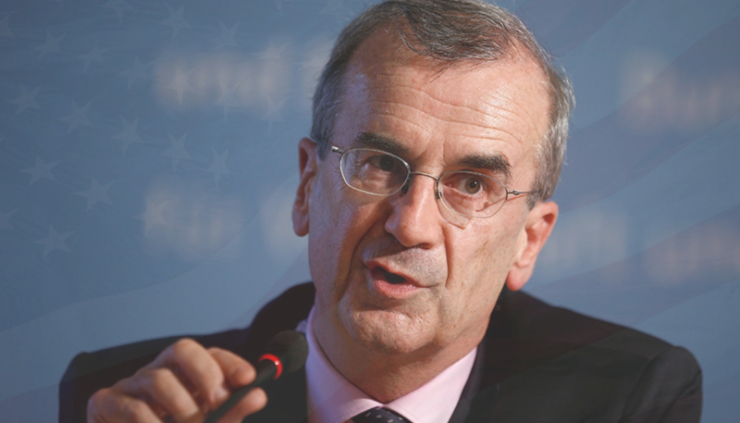The United States is playing with financial fire, and Europe is watching with concern. That’s the stark warning from François Villeroy de Galhau, a key member of the European Central Bank’s Governing Council, according to Bloomberg who believes the U.S. risks triggering the next major financial crisis through its increasing embrace of cryptocurrencies and non-bank finance.
“Financial crises often originate in the United States and spread to the rest of the world. By encouraging crypto-assets and non-bank finance, the American administration is sowing the seeds of future upheavals.”
In an interview with the French weekly La Tribune Dimanche, Villeroy stated that “the United States risks sinning through negligence” by promoting unregulated digital assets and alternative financial structures. He argued that Europe’s stricter regulatory stance offers a safer path forward.
But is this a legitimate warning or just another chapter in the growing financial divide between the U.S. and the EU?

US vs. Europe – Two Diverging Crypto Strategies
The U.S. has taken a sharp turn toward crypto acceptance under President Donald Trump. His administration has not only embraced Bitcoin and other digital assets but also taken decisive steps to integrate them into national finance.
Recent moves include:
- Establishing a Strategic Bitcoin Reserve to hedge against future economic uncertainties.
- Dismissing multiple SEC lawsuits against crypto firms, signaling a shift toward friendlier regulation.
This pro-crypto approach stands in stark contrast to Europe, where regulators have opted for a strict, rule-based framework. The Markets in Crypto-Assets (MiCA) regulation, which took effect in 2023, requires stringent oversight of digital asset service providers and strict compliance with financial security measures.
Villeroy believes Europe’s structured regulatory approach is the only way to prevent financial chaos. In his view, failing to regulate crypto and non-bank finance today will only lead to bigger problems tomorrow.
Interestingly, despite his concerns over crypto, Villeroy has been a vocal supporter of asset tokenization.
He believes that tokenizing real-world assets (RWAs) like stocks, bonds, and commodities could transform financial markets by improving:
- Liquidity: Faster transactions with instant settlement times.
- Transparency: Secure and auditable blockchain-based transactions.
- Efficiency: Reduced reliance on traditional financial intermediaries.
In January, Villeroy pushed for wider adoption of T+0 settlement cycles, where transactions are completed on the same day instead of the two-day standard (T+2).
His vision is clear: embrace blockchain for efficiency, but regulate crypto tightly to prevent instability.
Will a Digital Euro Compete with the Crypto Boom?
Villeroy’s concerns about the risks of crypto adoption in the U.S. are closely tied to Europe’s push for a digital euro.
The ECB has been researching the digital euro as a response to:
- The declining use of cash in everyday transactions.
- The growing dominance of private digital payment systems.
However, a recent ECB study found that most consumers wouldn’t use a digital euro if given a choice, raising questions about its real-world adoption.
Villeroy, however, remains firm. He believes central bank digital currencies (CBDCs) will play a crucial role in preserving financial stability—acting as a bridge between tokenized assets and traditional finance.
“A central bank digital currency would ensure convertibility between tokenized assets and serve as a reliable basis of trust for new technologies to realize their full potential.”
But with the U.S. fully embracing decentralized crypto, can the digital euro compete with Bitcoin, Ethereum, and stablecoins?
The Bigger Picture
The ECB and the U.S. are heading toward completely different financial futures.
- The U.S. is betting big on crypto, with a hands-off approach and a Strategic Bitcoin Reserve.
- Europe is doubling down on regulation, seeing crypto as a potential trigger for the next financial collapse.
Both sides have valid arguments.
On one hand, crypto innovation is unlocking new financial opportunities. On the other, unregulated speculation has led to repeated financial crises.
The question now is: Who’s making the right bet?
Will the U.S. ride the crypto wave to financial dominance, or will Europe’s strict regulations prove to be the safer path?
One thing is certain—the battle over financial control is just beginning.





